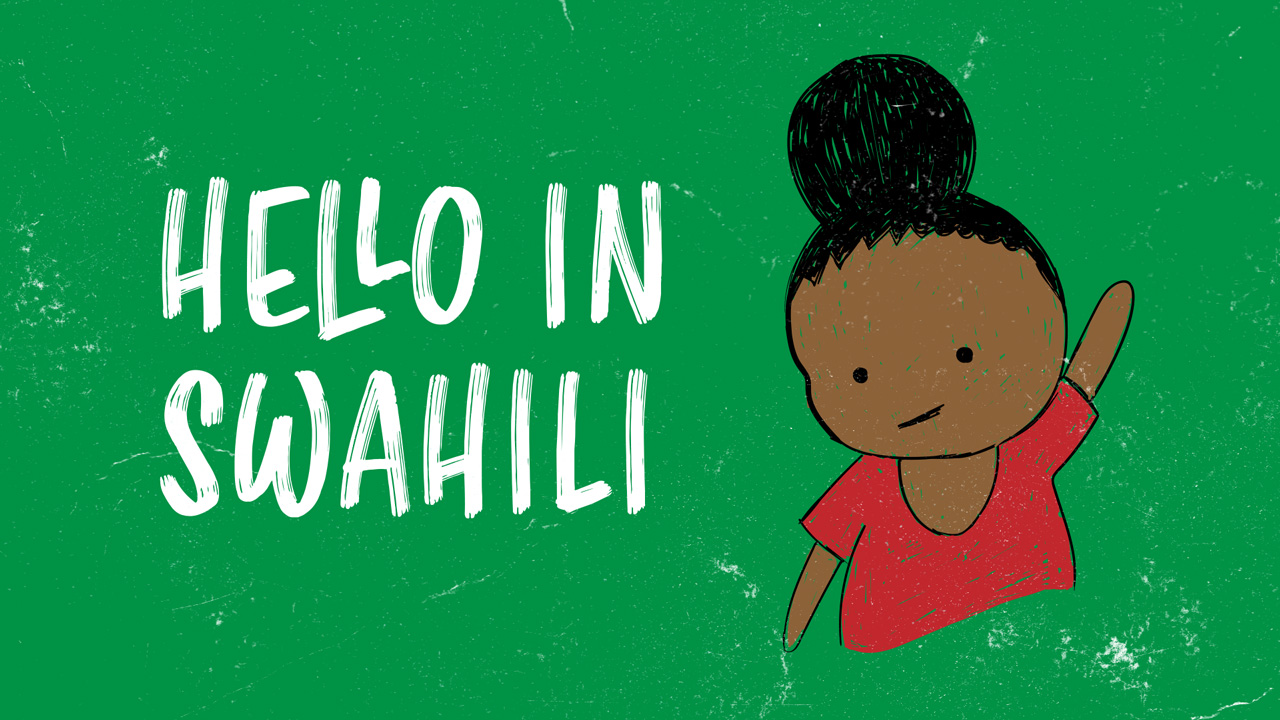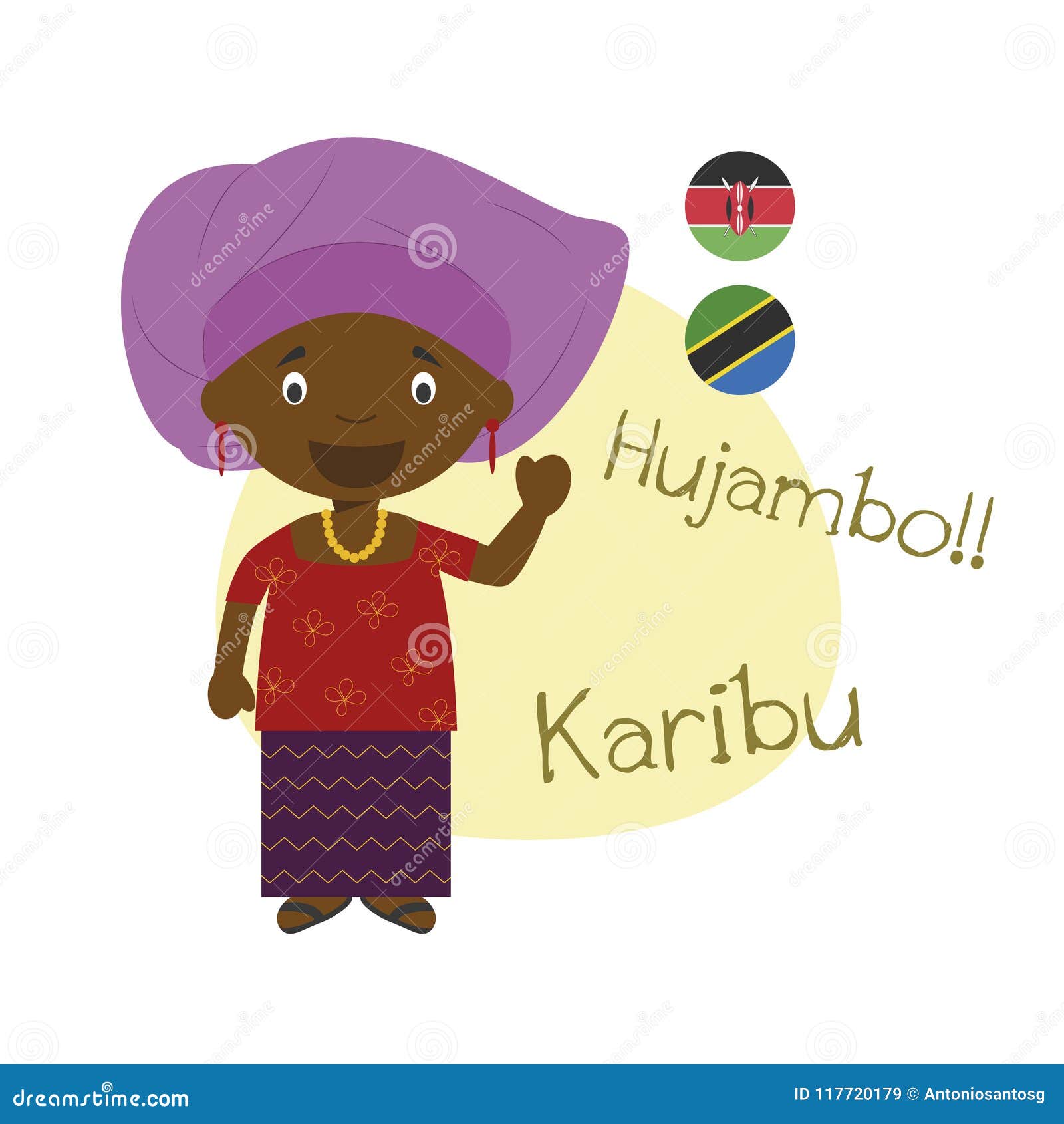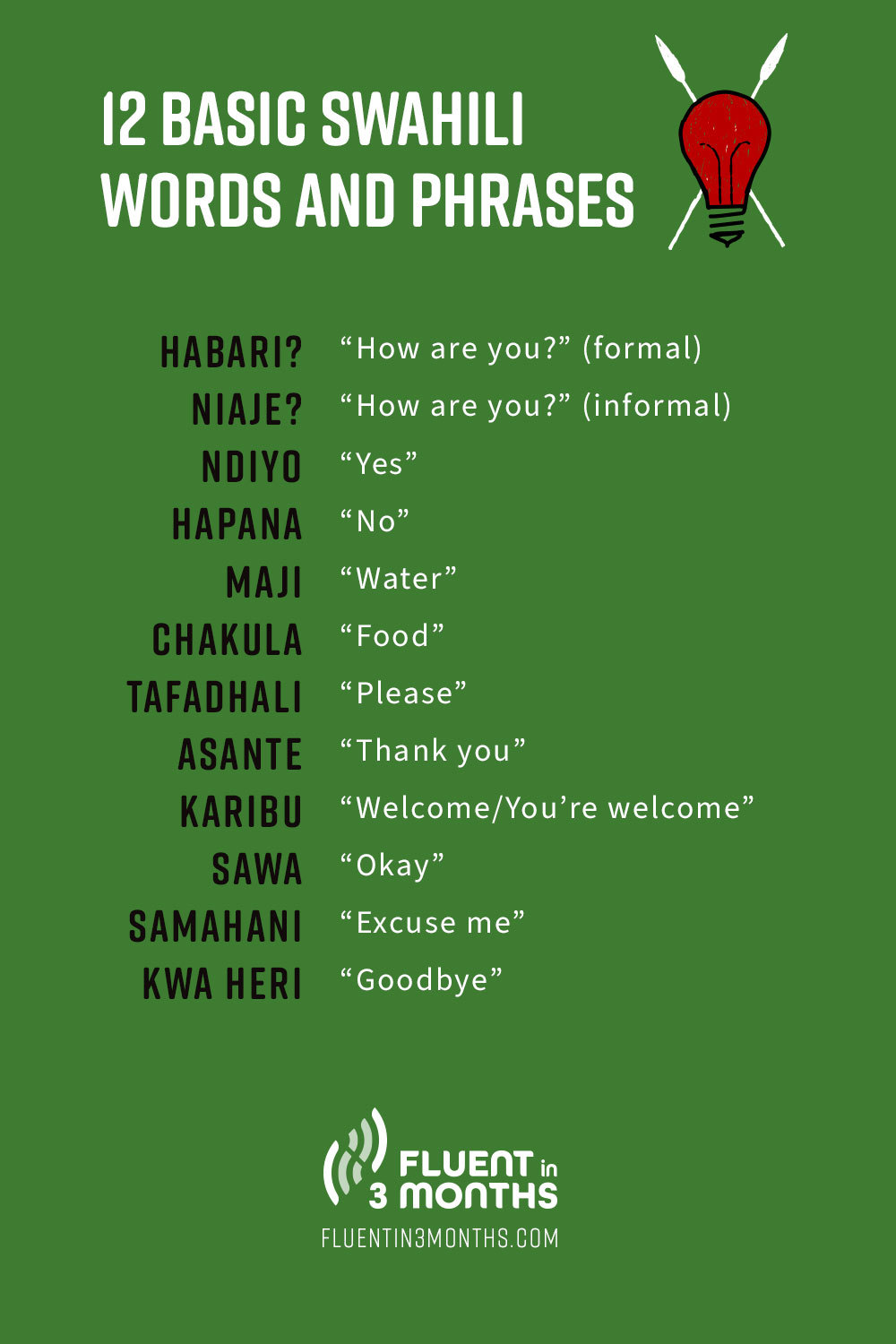
¡Hujambo! Significa Hola En Swahili Escritura Manual Con Colores De Bandera Kenya Stock de
The most common hello in Swahili li " and is used when meeting someone for the first time or casually passing by. To ask "How are you?", say "Habari gani?". The typical response is "Nzuri" - meaning "Fine" or "Good". If someone asks you "Habari yako?", they are asking specifically about you.

What Is Hi In Swahili Duane Pickrell Kapsels
The Swahili greeting means "hello." To say hello in Swahili, start with this cheerful greeting. Flash a bright smile, make eye contact, and enthusiastically say "Jambo!" Use Proper Etiquette When greeting someone, it's polite to ask "Habari?" (how are you?) or "Habari yako?" (how are you - singular).

Basic Swahili Phrases Learning A Second Language, Learning Languages, How To Say Hello, All
Do you want to learn how to say "Hello" in Swahili? Greetings are an important part of any language because they allow you to connect and communicate with others. If you're planning a trip to the country or are trying to learn Swahili, keep reading to discover some of the most important greetings. Let's get started! 🤗 Contents 1 Greetings

Learn Swahili Swahili in Three Minutes Greetings YouTube
Brandon: Hello everyone, and welcome to SwahiliPod101.com. This is Absolute Beginner, season 1, lesson 1 - Learning to Say Hello in Swahili. My name is Brandon. Medina: And I am Medina. Together we are going to guide you through the Swahili language. Brandon: In this lesson, you will learn how to say hello in Swahili.

Hello in Swahili “Habari?” and 14 More Swahili Greetings (and Their Response!)
Making the effort to speak the local language will always be viewed as a sign of interest and respect towards the culture, even if half the words are completely mispronounced. 1. Say hello in Swahili. How to say hello in Swahili as well as how to say please and thank you in Swahili! A few manners always go a long way.

Muriel Feelings Jambo Means Hello A Swahili Alphabet Book, Paperback elefant.ro
There are basically five ways to say hello in Swahili: Hujambo or jambo (how are you?) - Sijambo (seeJAmbo) (I am fine / no worries) Habari? (any news?) - nzuri (nZOOree) (fine) U hali gani? (oo HAlee GAnee) (how are you) - njema (fine) Shikamoo (a young person to an elder) - marahaba For casual interactions: mambo? Or Vipi?

Basic Swahili by Anita Ellero
Would love to see native speakers in life situations to learn culture of indigenous people! SwahiliPod101.com. 2018-12-25 15:55:34. Jambo Tiger, Yes you are doing well. habari yako. jambo, shikamoo are all ways of saying hi. Joshua.

How to Say Hello in Swahili Guide to Swahili Greetings
Lesson 1 - Greetings in Swahili. In Swahili, "salamu" means "greetings" or "salutations.". Greetings in Swahili culture are an essential aspect of social interactions, and they often go beyond a simple "hello.". Swahili speakers take the time to ask about one another's well-being, family, and daily life.

Illustration Of The Text Hello In The Swahili Language Stock Illustration Download Image Now
Want to learn to speak even more Swahili the fast, fun and easy way? Then sign up for your free lifetime account right now, click here https://bit.ly/3blEChc.

Key Swahili words and phrases such as hello, goodbye with audio. Polish words, Swahili, Words
Greetings play an essential role in every culture and language, serving as an important way to establish connections and show respect. If you're interested in learning how to say hello in Swahili, this guide will provide you with both formal and informal greetings, as well as some regional variations. Whether you're planning a trip to East Africa or just want to expand your linguistic.

Vector Illustration of Cartoon Character Saying Hello and in Swahili Stock Vector
Habari means "hi" or "hello.". We use it when we meet people. We can use this greeting with friends or relatives, but also with people we don't know. And the formal way of greeting people is Shikamoo! During the evening we say: Habari ya jioni! Jioni is Swahili for "evening," so Habari ya jioni means "good evening.".

FORMAL SWAHILI GREETINGS 7 Different ways to say hello in Swahili YouTube
The Truth About The Swahili Language. Well, the truth is that Swahili is not as hard to learn as other languages. It is a phonetic language, making it easy to understand and memorize.. This is a ubiquitous greeting for them. Such greeting literally means "Hello." If you google "How to say hello in Swahili," this will come up first.

The Only Swahili Pronunciation Guide You’ll Ever Need
It is similar in meaning to the English word Hello . Linguistically Specifically, Jambo is a Swahili language word that belongs to noun classes 5-6 for "collectives". Jambo primarily means 'affair', [1] in the sense of commercial, professional, public or personal business. [2] [3] Etymologically it is from amba (-amba) meaning to say.

Ways of greetings in swahili, how to greet in swahili language YouTube
Say "Hello" in Swahili to Your Friends: Colloquial Swahili Greetings 1. Habari? 2. Mambo? 3. Vipi? 4. Upo? 5. Niambie 6. Inakuwaje? 7. Unaendeleaje? 8. Umeamkaje? 9.Umeshindaje? Beyond the Standard Responses Polite Greetings 10. Hujambo? 11. Shikamoo 12.

How to Learn Swahili An InDepth Guide (With Resources!) fluent in 2 months
Swahili (Kiswahili) is a Bantu language that's spoken by the Swahili people across and beyond East Africa, including Tanzania, Kenya, Uganda, Somalia, Rwanda, Burundi, Democratic Republic of Congo, Malawi, Zambia and Mozambique. Strongly influenced by and initially written in Arabic, Swahili is now more commonly written using the Latin alphabet.

Hello in Swahili — 8 Simple Greetings that aren't "Jambo"
Hello: jambo/ hujambo/ salama How are you?: habari gani Fine (response): nzuri Goodbye: kwa heri/ kwa herini (more than one peson) See you later: tutaonana Nice to meet you: nafurahi kukuona Goodnight: lala salama Civilities Yes: ndiyo No: hapana Thank you: asante Thank you very much: asante sana Please: tafadhali OK: sawa Excuse me: samahani